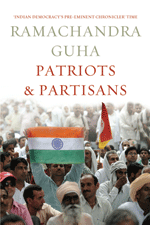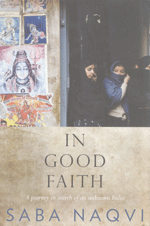Patriots and Partisans by Ramachandra Guha; Penguin Books; Price: Rs.699; 334 pp
 Following India after Gandhi: The History of the World’s Largest Democracy (2007) and the Makers of Modern India (2012), sociologist, historian and quintessential liberal intellectual Ramachandra Guha’s latest gift to the nation is Patriots and Partisans, a collection of 15 fluent, insightful essays on human and political conditions within the republic and their causes and effects. Confessing that he is “a person with moderate views sometimes expressed in extreme fashion” who has taken to heart the observation of his friend and teacher Dr. Dharma Kumar, former professor at the Delhi School of Economics, that liberals tend to be “a supine lot” who are “rolled over in the public discourse by the more committed (in all senses) extremists of the left and right,” in this compendium Guha argues the case for liberalism — particularly Nehruvian liberalism.
Following India after Gandhi: The History of the World’s Largest Democracy (2007) and the Makers of Modern India (2012), sociologist, historian and quintessential liberal intellectual Ramachandra Guha’s latest gift to the nation is Patriots and Partisans, a collection of 15 fluent, insightful essays on human and political conditions within the republic and their causes and effects. Confessing that he is “a person with moderate views sometimes expressed in extreme fashion” who has taken to heart the observation of his friend and teacher Dr. Dharma Kumar, former professor at the Delhi School of Economics, that liberals tend to be “a supine lot” who are “rolled over in the public discourse by the more committed (in all senses) extremists of the left and right,” in this compendium Guha argues the case for liberalism — particularly Nehruvian liberalism.
Certainly one of the valuable takeaways for this reviewer from these perspicacious essays is that they have prompted a reassessment and course correction in the appraisal of Jawaharlal Nehru, of whom I have tended to be harshly critical these past years, for supposedly imposing the Soviet-inspired centrally planned, public sector-led heavy industry development model upon the economy. As editor of the country’s first two business magazines, I blamed Nehru for stifling India’s centuries-old tradition of private enterprise and trade. After the assassination of Mahatma Gandhi in 1948 and death of deputy prime minister Vallabhbhai Patel in 1950, Nehru dominated Indian politics like a colossus. If only he had tapped the vast reservoir of entrepreneurship in the business houses of G.D. Birla, JRD Tata, the Shri Ram Group (of DCM), Kasturbhai Lalbhai, Walchand Hirachand, Mafatlals, Goenkas among others, who in the teeth of imperial policies of discrimination, had built rock-solid manufacturing enterprises, post-independence India would have emerged as a model for the development of the newly-liberated Afro-Asian countries of the third world.
Instead, Nehru opted to experiment with democratic socialism in the vain hope that business-illiterate, risk-averse clerks would transform capital-intensive public sector enterprises (PSEs) into massive corporations which would “dominate the commanding heights of the Indian economy” and lead the nation into prosperity. Worse, by pouring national resources into under-performing PSEs, the Nehruvian development model under-invested in primary education, public health and adult literacy. The consequences of this ideological wrong-turn and skewed priorities have proved disastrous, wiping out the modest aspirations of an entire generation.
But while this indictment is not wholly unwarranted, there are several mitigating circumstances which warrant a milder sentence for Nehru, who in Guha’s opinion was the brave and bold architect of the plural, secular and inclusive republic of India, a simultaneously unique and “exasperating” nation. In an eloquent essay titled ‘Verdicts of Nehru: the rise and fall of a reputation’, the author challenges the above assumptions. Offering an incisive analysis of the huge investments in PSEs to build the infrastructure for industry, Guha reveals that it was the outcome of a national consensus which had the full endorsement of Indian industry.
He recounts that in 1944 the country’s top industrialists including JRD Tata and G.D. Birla, had issued the Bombay Plan which “called for the state to invest in infrastructure and protect them (industry) from foreign competition”. “Behind the mixed economy model therefore, was a massive consensus, one shared by economists, technocrats, politicians and, not least industrialists,” writes the author.
In this illuminating essay on the founder of the democratic modern Indian state, Guha ascribes many of the myriad sins of omission and commission heaped upon Nehru — of favouring dynastic rule, suborning the bureaucracy and judiciary, pervasive corruption — to his daughter Indira Gandhi, who became the accidental prime minister of India following the mysterious and untimely death in distant Tashkent, of Nehru’s chosen successor Lal Bahadur Shastri in 1966. At the end of another enlightening 16-page essay evocatively titled ‘A short history of Congress chamchagiri (sycophancy)’ Guha speculates about how Indian history would have been radically different if Shastri had lived another five years.
Besides these two engrossing essays, there are 13 others in this anthology which constitute an eclectic but smooth mix. In felicitous prose Guha speculates upon the future of the Indian Left; discusses the clash between the professor (prime minister Manmohan Singh) and the protestor (Anna Hazare) during the latter’s nationally electrifying anti-corruption campaign of 2011; and revisits the Sino-Indian border conflict of 1962 — in which the Indian Army was humiliatingly defeated — to ascertain its causes, effects and consequences which remain unresolved half a century later.
This collection features two chapters — ‘Debating Democracy’ and the intriguingly titled ‘The Word and the World’. In four essays in the latter, Guha ruminates about the ‘The rise and fall of the bilingual intellectual’ and includes three tributes to Oxford University Press, Bangalore’s recently demised Premier Book Shop and to the late Krishna Raj, editor of the Economic and Political Weekly who indefatigably served this scholarly journal for over three decades. Yet the most interesting essays in the second part are ‘Pluralism in the Indian university’ and ‘In Nehru’s House’. In the former, the learned author laments the decline of India’s universities and offers five eminently sensible suggestions which could serve as starting points for reform.
And in the second he provides a case study of the development, decline and possible rehabilitation of the Nehru Memorial Museum and Library (NMML) housed in the “second grandest residence in New Delhi” of the commander-in-chief of the British Indian Army, which was requisitioned for India’s first prime minister and rechristened Teen Murti House in 1948. After Nehru’s death in 1964 it was converted into NMML. To rescue and resuscitate India’s crumbling universities and academic institutions, these two essays should be mandatory reading for all vice chancellors and academics in India’s 611 universities, currently headed in a race towards the bottom in global rankings.
Brilliant and infused with deep sociological and historical insights, this collection of writings is eminently readable and highly recommended to all interested in deriving some meaning from the functioning anarchy that is India.
Dilip Thakore
Syncreticism stories
In Good Faith by Saba Naqvi; Rupa Publications; Price: Rs.395; 190 pp
 Lived religion hardly corresponds to convenient textbook definitions which homogenise diverse religious beliefs and expressions and box them into neatly-definable and easily-manageable categories. But this isn’t quite how religion is practiced in the real world outside seminaries.
Lived religion hardly corresponds to convenient textbook definitions which homogenise diverse religious beliefs and expressions and box them into neatly-definable and easily-manageable categories. But this isn’t quite how religion is practiced in the real world outside seminaries.
Typically, textbooks define religion as a fixed body of scripture, dogmas and practices, suggesting that those who follow a particular religion share exactly the same beliefs, even though they may differ in terms of how seriously they adhere to, or practice them. Moreover, according to the clergy and the orthodox, each religion is wholly distinct from others. Even though two faiths may propagate common values, they are presented to the laity as entirely different cognitive worlds with negligible commonalities.
In the ‘unknown India’ into which journalist Saba Naqvi journeys — literally cross-country — she discovers scores of individuals, castes, communities and historical legends that defy conventional nostrums that the religious communities of India are sharply divided by mutually antagonistic creeds. “This work examines the several syncretic traditions that survive in India… it explores India’s composite culture and perhaps perpetuates one of the greatest clichés about India — that it is a land of contradictions, dualism, and pure chaos. There are no absolute truths here,” she writes in the preface of this book which highlights the commonalities (‘syncreticism’) of India’s supposedly distinct religions.
Naqvi’s investigation of religious syncreticism in India which is certain to discomfit hindutva champions and the Muslim clergy who have profited from practicing identity politics, has undoubtedly been prompted by her own syncretic religious background. Her father is a Shia Muslim and her mother a Christian, the daughter of an ardent evangelist. Naqvi’s former husband is a Bengali Hindu. She describes with candour her childhood within homes with differing religious traditions and identities.
If you believe there’s little in common between Hindus and Muslims in terms of religious belief and practice, you’ll be forced to rethink your position on reading the 34 delightful stories shedding light on religious amity and syncreticism in pockets across the country. You’ll encounter a Muslim ‘goddess’ named Bon Bibi, worshipped by both Hindus and Muslims in the Sunderbans in Bengal; low-caste Bengali Muslim chitrakars, originally wandering minstrels, who paint pictures of Hindu deities and sing their praises; a Brahmin priest in Kolkata who has constructed a mausoleum for a Muslim saint; Maharashtrian Sufis who wrote books on yoga and had Hindu disciples; Banjara tribals in Hyderabad who mourn for Hussain in the month of Moharram; the Muslim female consort of a Hindu god in a popular temple in Tamil Nadu, among other contradictions. Equally intriguing are reports about castes in Tamil Nadu whose Christian and Hindu members freely intermarry, and churches which are hardly distinguishable from Hindu temples.
By highlighting such examples of traditions and communities which challenge orthodoxy and propagation and practice of divisive identity politics, Naqvi adds a new dimension to communal debates which arouse strong emotions. If vast numbers of Hindus and Muslims in “unknown India” can live in harmony with traditions, customs and myths that subvert orthodox beliefs and codes, why can’t the rest of us?
Nevertheless as Naqvi acknowledges, there could be more than meets the eye in the religious syncreticism discussed in this book. Shrines which attract devotees from different faiths may not be the exemplary centres of communal harmony they are projected to be. They may well be centres of crass superstition, or holy spots where crafty clerics extract lucrative donations from the credulous. Just because they unite Hindus and Muslims and others to practice superstition, it should not necessarily become reason to celebrate them.
Nevertheless In Good Faith is an easy-to-read volume with true stories which are certain to inspire people fed up with religious orthodoxy, and looking for ways and means to build bridges rather than walls between India’s numerous communities.
Yoginder Sikand























